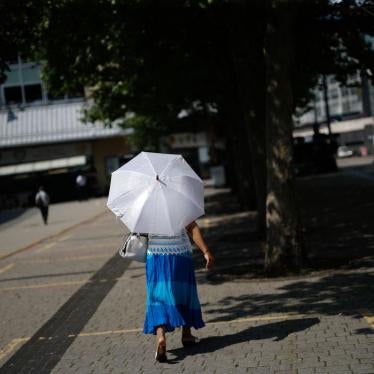(London) – The United Kingdom government policies and practices at home often showed scant regard for human rights in 2021, and its commitment to human rights in its foreign policy was inconsistent, Human Rights Watch said today in its World Report 2022.
“The UK government seems happy to jettison human rights at home when expedient, and its rights record on the world stage is decidedly mixed,” said Yasmine Ahmed, UK director at Human Rights Watch. “If the UK government is serious about tackling inequality at home and promoting international rules abroad, it needs to ensure that its policies are built on respect for human rights.”
In the 752-page World Report 2022, its 32nd edition, Human Rights Watch reviews human rights practices in nearly 100 countries. Executive Director Kenneth Roth challenges the conventional wisdom that autocracy is ascendent. In country after country, large numbers of people have recently taken to the streets, even at the risk of being arrested or shot, showing that the appeal of democracy remains strong. Meanwhile, autocrats are finding it more difficult to manipulate elections in their favor. Still, he says, democratic leaders must do a better job of meeting national and global challenges and of making sure that democracy delivers on its promised dividends.
The UK’s migration policy and rhetoric largely centered around an increase in the number of migrants and asylum seekers crossing the English Channel by boat. The proposed legislation would fundamentally undermine the UK’s international refugee and human rights obligations. It would criminalize those seeking to enter the UK irregularly and establish a two-tier, discriminatory asylum system based on the mode of arrival. The government has established two resettlement and relocation plans for Afghans, one of which includes accepting 20,000 Afghan refugees over five years. However, the plans only cover Afghans and do not discharge the government’s obligation to respect the right to seek asylum in the UK.
The government proceeded in October with a decision to reduce social security support in what one domestic organization, the Joseph Rowntree Foundation, called “the single largest overnight postwar welfare cut.” The cut went ahead despite repeated warnings from domestic specialist groups and international experts that it would cause widespread harm and violate international human rights law, including the right to food. Food bank use has reached a record high.
New domestic violence legislation, which entered into force in May, made some positive changes, including a statutory definition of “domestic abuse,” but excluded key protections for migrant women. Official statistics documenting a significant decrease in suspects charged with rape or domestic abuse, despite increased reports to the police, indicated the failure of ministerial commitments to arrest the downward trend.
Lengthy waiting times in charging and prosecuting suspects, lack of government support for specialist services for women who have experienced violence – particularly for Black, Asian, and other minoritized communities – and poor treatment of victims by police create additional barriers to protection from violence and access to justice. The rape and murder of a woman by a serving police officer, along with revelations of a sexist culture within policing and proceedings relating to abuses by undercover policemen, raised serious concerns and further undermined public confidence in police protection from gender-based violence.
Concerns also remain about failures to take seriously institutional racism, inadequate action to ensure access to abortion in Northern Ireland, and government efforts to obstruct accountability for abuses by armed forces.
On the world stage, the UK continued to use its influence to draw attention to and challenge human rights abuses including in China, Myanmar, Sri Lanka, and Egypt. The UK hosted the COP26 Climate Summit, committed to developing an Open Societies agenda, and appointed a special envoy on LGBT rights. However, when weighed against other interests, the UK didn’t always prioritize human rights in its foreign policy agenda including when selling arms to Saudi Arabia, reinstating trade preferences to Cambodia, and opposing accountability for violations of human rights in Israel/Palestine.









